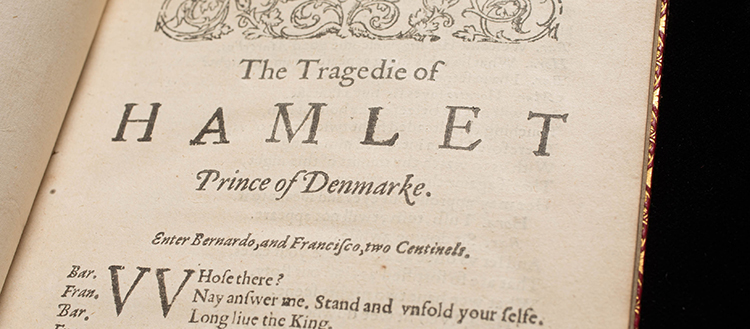A Unique Collection of Shakespeare Editions Digitized
The Fondation Martin Bodmer hosts the greatest collection of early Shakespeare editions outside the English-speaking world. Researchers from UNIGE unveil its secrets and history.

William Shakespeare, The Tragedy of Hamlet, Prince of Denmarke, London, forJohn Smethwick, 1611, Third edition, Cologny, Fondation Martin Bodmer.
The Fondation Martin Bodmer located in Cologny (Geneva) hosts the greatest collection of early Shakespeare editions outside the English-speaking world: 36 titles from Shakespeare are part of the 174 volumes of the collection of “Early Modern English Books”. Published between the late fifteenth and the end of the seventeenth century, these books have been digitized by The Bodmer Lab from the University of Geneva (UNIGE) and will be made freely available to the public. Scholars across the world will gain easy access to more than 50,000 images of books that were hardly accessible before. With the book Shakespeare in Geneva, two UNIGE researchers bring these unknown documents into new light and reveal how Martin Bodmer built his collection.
Describing each item in the collection, Shakespeare in Geneva, written by Lukas Erne and Devani Singh, shows the importance of Shakespeare to Martin Bodmer and documents how the latter built his collection from 1914 onwards. Two quotations from Martin Bodmer himself are self-explanatory and describe the very beginnings of his great library: “My first acquisition - I was about fifteen – was Shakespeare’s Tempest illustrated by Dulac”, says Martin Bodmer as quoted in Shakespeare in Geneva. “I see it in a bookshop window, and I cannot help but passing by, again and again to look at it. Finally, I summon all my courage and ask for the price – it is thirty francs, but I only have twenty-nine! Nonetheless, the bookseller lets me have the volume, urging me not to forget my debt. I have settled it, but my purse has been empty ever since.”
“The greatest magician of all”
Reflecting on the early conception of the library, Bodmer also wrote, “When I started to think about what I wanted my collection to look like my favourites were not German. First, Shakespeare, the greatest magician of all.”
The purchase of the Rosenbach collection represented a significant addition to Martin Bodmer’s collection. Martin Bodmer demonstrated sharp negotiation skills to acquire these priceless volumes during World War II, and this acquisition generated quite some emotion in the USA. When the precious volumes were shipped to Geneva, after the end of the war, a farewell party, attended by President Truman’s daughter Margaret and other dignitaries, was organized for the departing treasures. It was widely reported in the press as an unprecedented event: “the first time in the history of the United States that a world-famous collection of books left its shores for Europe” wrote one commentator, whereas the headline in Time magazine read “Goodbye, Shakespeare”.
“Martin Bodmer is a towering figure among twentieth-century book collectors, yet the history of his collection of early Shakespeare editions and other early modern English books has never been told, and its make-up never been analysed. These are the lacunae our book is meant to fill” comment Lukas Erne and Devani Singh.
Exciting new possibilities for further research
Shakespeare in Geneva provides a detailed description of each piece of the collection, accompanied by supporting material issued from the research, to facilitate access and understanding of the collection by non-academics. It is the latest publication of The Bodmer Lab, a research and digitization program of the UNIGE. The Bodmer Lab is currently digitizing all the volumes of the constellation “Early Modern English Books” four of which are already available online, with the remaining ones due to be online by mid-2018.
“The Bodmer Lab’s digitization of the early modern English books assembled by Martin Bodmer makes available to scholars and students one of the best collections of early Shakespeare editions in the world, using the tools of the digital era to transform the way literary scholarship is conducted and opening exciting possibilities for further research” add Singh and Erne.
The constellation “Early Modern English Books”
It consists of 36 titles from Shakespeare, and 138 titles from other authors, totaling more than 50’000 images. Digitized versions are or will be available on The Bodmer Lab website. The constellation includes:
- A pristine copy, in original calf binding, of the First Folio edition (1623) of Shakespeare’s collected dramatic works.
- A copy of the first edition of Shakespeare’s Troilus and Cressida (1609) whose edges are uncut (i.e. untrimmed). This is the only copy in the world of a Shakespeare quarto published during his lifetime to have this bibliographical feature.
- A copy of every Shakespeare play, with one exception, that was published before the First Folio.
- A copy of the 1598 quarto of Love’s Labour’s Lost, the earliest extant edition of any work, play or poem, with Shakespeare’s name on the title page.
- The greatest number of Shakespeare quarto playbooks outside the English-speaking world (26 volumes).
- The first illustrated edition of The Canterbury Tales by Geoffrey Chaucer, printed around 1484. Its 26 woodcut illustrations of the pilgrims make it one of the most renowned ever printed in English.
- A unique copy of Tyndale’s New Testament printed in Zürich.
- A unique copy of an undated folio of Arthur of Brytain.
About the Bodmer Lab
The Bodmer Lab, initiated in 2015, is a research and digitization program of the University of Geneva that examines and makes available online significant parts of the holdings of the Fondation Martin Bodmer in Cologny (Geneva), employing methods and tools of the digital humanities. More than 20 academic researchers and 40 volunteers contribute to the research, digitization and publication activities. The mission of the Bodmer Lab is to create digital archives of World Literature, based on the Bodmer Collection, and to facilitate access to, and use of, these archives for the broadest possible public.
30 Jan 2018